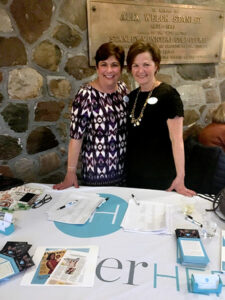By Barbara Allen, Contributing Writer

Photo/submitted
Norwell – Losing a mother at any age is a heartrending experience, but the death of a mother when a girl is still young can be especially devastating. Even with the support of family and friends, a motherless girl might feel alone in her loss, as if no one understands the challenges and pain she is experiencing as she moves forward in a life without her mom.
EmpowerHER was founded in 2013 by Cara Belvin, who lost her own mother to breast cancer when she was only nine years old, to specifically address the needs of these girls. The nonprofit organization, based out of Norwell, and with chapters in Massachusetts and Connecticut, is a non-therapeutic, community-based program which sponsors events where they can meet, share their experiences, grief, struggles and joys. It also offers a 1:1 Mentor Match Program, which matches young girls with a female mentor, oftentimes someone who has also experienced the death of her mother at a young age, who offers additional support and encouragement.
Joanie Quealy first learned about empowerHER after her relocation from Northborough to Scituate. She had left behind a long career as a registered nurse, having worked for many years in pediatrics at Southboro Medical Group, then later in Student Health Services at Boston College. As she pondered the next phase of her life over 50, she came across an article about Cara Belvin. Moved by her story, she contacted Belvin to volunteer with empowerHER. As the organization grew, Quealy was eventually hired part-time as Mentor Program Coordinator.
“It’s an amazing, rewarding job,” she said.
She works in close collaboration with Diane Burke, empowerHER’s Family Intake Coordinator, whom Quealy has known since they were friends and neighbors in Northborough. Burke had also relocated to Scituate and volunteered with the organization before becoming hired part-time, first as Executive Assistant, then later in her current position.
“I saw the passion Joanie had for empowerHER,” she said. “I heard Cara’s story. I thought of my own daughter, who is 27, but wouldn’t survive a day without my husband and me.”
Quealy and Burke together screen potential mentors and strive to find the best match among the 175 girls currently enrolled with empowerHER.
“It takes a lot of time, energy and work,” said Quealy. “We have made 40 matches over the past two years.”
Referrals to the program are made by family members or friends of the mother of a girl whose mother has died, guidance counselors, DCF workers and sometimes, but least often, the girl’s own dad, who may still be dealing with his own grief. After the referral is made, Burke meets with the girl’s parent or guardian to conduct an intake interview and begin the process of finding a mentor.
“Women who choose to be a mentor offer a big commitment of self, heart and soul,” Burke noted.
“Mentors are asked to give a one year commitment of 5-6 hours per month to their mentee,” said Quealy. They can spend those hours attending empowerHER sponsored events with their mentee or choose to spend time together on their own. Mentors are also required to attend mandatory training and check in monthly with Quealy via email about how the mentorship is going, whether they need help or have any concerns. The 1:1 Mentor Match Program is affiliated with Massachusetts Mentor Program and all potential mentors receive a thorough background check and are monitored throughout their involvement in the program.
At the end of the year, the match is reviewed, and the mentor/mentee are questioned as to whether they want to continue for another year.
“The second year has a different feel to it,” said Quealy.
The girls have established trust, the relationship has been built and is likely to carry on, on its own.
“It does take time for the mentor to make a connection to the girl,” she explained. “Some are nervous about trusting another person. Much of the relationship is about building trust, and eventually, a life-long friendship.”
“Dealing with grief adds another whole layer,” Quealy added.
Burke agreed. “We persevere in finding the right match because the last thing in the world we want to do is make a match that wouldn’t work, and have a girl have to deal with another loss.”
Both Quealy and Burke agreed that so many of the matches are special connections, but Burke recalled one that was particularly poignant. A high school girl, lacking in confidence and self-esteem, who always walked with her head down, had requested a mentor with very specific requirements: someone who was college-educated and could help her prepare for college. She was matched with her mentor in her junior year; together they applied to colleges and worked on her college essays. She was accepted into the colleges of her choice, and when she next attended an empowerHER function, she walked in with her head held high.
“She was a rosebud whose mentor helped her blossom into a rose,” said Burke.
For more information about empowerHER, visit their website at www.empoweringher.org.












